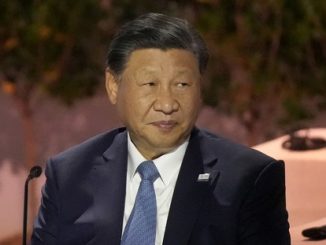
Switzerland’s Economy Minister Federal Councillor Guy Parmelin, left, shakes hands with Chinese Vice Premier He Lifeng, right, next to Switzerland’s President Karin Keller-Sutter, center, during a bilateral meeting between Switzerland and China, in Geneva, Switzerland, on Friday, May 9, 2025. (Martial Trezzini/Keystone via AP, Pool)
| Published May 10, 2025
U.S. and Chinese officials have commenced high-level trade negotiations in Geneva, aiming to de-escalate a trade war that has imposed significant tariffs and disrupted global markets. U.S. Treasury Secretary Scott Bessent and Chinese Vice Premier He Lifeng are leading the talks, which are considered preliminary steps toward resolving the ongoing economic tensions.
Key Points:
-
Tariff Escalation: The U.S. has imposed a 145% tariff on Chinese goods, citing unfair trade practices and concerns over China’s role in fentanyl production. In response, China has implemented a 125% tariff on U.S. products.
-
Economic Impact: These tariffs have led to a significant decline in trade between the two nations, affecting global supply chains and economic stability. Chinese exporters have experienced a 60% drop in container shipments to the U.S., prompting some to prepare for potential easing of tariffs.
-
Negotiation Stance: President Trump has indicated a willingness to consider reducing tariffs to 80%, but the White House clarified that any reduction would require reciprocal concessions from China.
-
Market Reactions: The initiation of talks has led to cautious optimism in global markets, with slight rebounds observed in major indices and oil prices.
Outlook:
While expectations for a comprehensive agreement remain low due to deep-seated mistrust and complex issues, the Geneva talks represent a positive step toward re-establishing dialogue. Analysts suggest that even a modest rollback in tariffs or a framework for continued negotiations could provide some relief to global markets.
The implications of the U.S.-China trade talks in Geneva are significant, impacting global trade, economic stability, and international relations:
1. Global Economic Stability:
-
Potential Relief for Supply Chains: Any agreement to reduce tariffs could revive trade flows between the U.S. and China, stabilizing global supply chains disrupted by the trade war.
-
Market Volatility: Continued uncertainty around negotiations may cause fluctuations in global stock markets, commodities, and currency values.
2. U.S. Domestic Economy:
-
Reduced Consumer Prices: Lower tariffs on Chinese goods could lead to reduced prices for U.S. consumers, particularly in electronics, clothing, and household goods.
-
Job Market Impact: Some U.S. industries, like steel and manufacturing, may resist tariff reductions, fearing increased competition from Chinese imports.
3. Chinese Economic Strategy:
-
Export Recovery: A deal could help Chinese exporters regain access to the U.S. market, boosting economic growth.
-
Strategic Concessions: China may agree to certain reforms, such as enhanced anti-fentanyl measures or market access for U.S. companies, to secure tariff relief.
4. Geopolitical Relations:
-
Improved Diplomatic Ties: Successful negotiations could ease tensions between the U.S. and China, creating opportunities for cooperation in other areas (climate, security).
-
Regional Impact: Neighboring Asian economies may benefit from increased trade activity if tariffs are reduced.
5. Political Repercussions in the U.S.:
-
Domestic Criticism: President Trump may face criticism from both sides—supporters who view any tariff reduction as a concession and critics who argue that the trade war harmed U.S. businesses.
-
2026 Elections: The outcome of the talks could influence voter sentiment, particularly in states dependent on exports or vulnerable to import competition.
Overall Takeaway
While they represent a critical step toward de-escalating a damaging trade war, the path to a lasting resolution remains uncertain. Both nations are navigating complex economic, political, and diplomatic challenges, with the U.S. seeking reciprocal concessions from China and Beijing aiming to revive its export-driven economy. Any agreement reached could stabilize global markets and lower consumer prices, but unresolved issues and domestic political pressures on both sides could easily derail progress.
SOURCES: NEWSMAX – Tariff Talks Begin Between US, Chinese Officials in Geneva
REUTERS – US and Chinese officials pursue Geneva talks on easing trade war
AL JAZEERA – China, US hold talks on tariffs in first bid to de-escalate trade war
AP NEWS – Tariff talks begin between US and Chinese officials in Geneva as the world looks for signs of hope





Be the first to comment